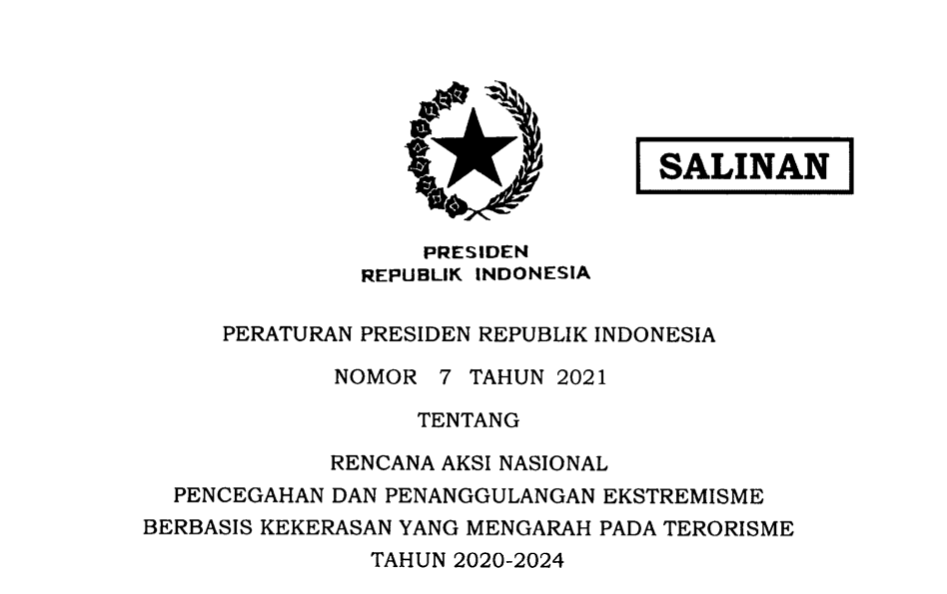Gov’t Issues Regulation on Action Plan to Tackle Violent Extremism

President Joko “Jokowi” Widodo has signed Presidential Regulation Number 7 of 2021 on the 2020-2024 National Action Plan for Preventing and Overcoming Violent Extremism that Leads to Terrorism.
The Regulation, signed by the President on 6 January 2021, aims to overcome the increasing threat of violent extremism that leads to terrorism in Indonesia.
Article 1 paragraph (2) of the Regulation states that violent extremism that leads to terrorism is a belief and/or action that use violent means or threats of extreme violence with the aim of supporting or committing acts of terrorism.
Paragraph (4) of the Regulation stipulates that the National Action Plan for Preventing and Overcoming Violent Extremism that Leads to Terrorism is a series of activities carried out in a systematic and planned manner to prevent and overcome violent extremism that leads to terrorism which is used as a reference for Ministries, Agencies, and regional governments in preventing and overcoming violent extremism that leads to terrorism.
“The Action Plan aims to improve the protection of citizens’ rights to be safe from violent extremism that leads to terrorism, as part of the implementation of state obligations on human rights in order to maintain national security based on the State ideology Pancasila and the 1945 Constitution of the Republic of Indonesia,” Article 2 paragraph (2) of the Regulation reads.
The Action Plan prioritizes a soft approach in tackling violent extremism that leads to terrorism. The formulation and implementation of the Action Plan emphasizes the overall involvement of the Government and the public, as an integral part of the soft approach and hard approach in countering terrorism.
The Action Plan includes 3 (three) pillars, namely the pillar of prevention, the pillar of Law enforcement and the pillar of international partnership and cooperation.
The Action Plan takes into account principles of human rights; rule of law and justice; gender mainstreaming and fulfillment of children’s rights; security and safety; good governance; multiple participation and stakeholders; as well as diversity and local wisdom.
Based on the considerations, the Action Plan will be implemented through the following steps:
- Coordination between Government Ministries/Agencies in order to prevent and tackle violent extremism that leads to terrorism;
- Participation and synergy in the implementation of programs to prevent and tackle violent extremism that leads to terrorism;
- Capacity building of human resources in the field of prevention and control of violent extremism that leads to terrorism;
- Supervision, early detection and early prevention of actions and messages of violent extremism that leads to terrorism; and
- Support for victims of criminal acts of terrorism and protection of infrastructure and strategic infrastructure.
The specific objectives of the Action Plan include:
- Improve coordination between Ministries/Agencies in order to prevent and tackle violent extremism that leads to terrorism;
- Increase participation and synergy in the implementation of programs to prevent and tackle violent extremism that leads to terrorism;
- Develop data collection and monitoring instruments and systems to support efforts to prevent and tackle violent extremism that leads to terrorism;
- Increase the capacity of the apparatus and infrastructure in a systematic and sustainable manner, to support programs for the prevention and tackle of violent extremism that leads to terrorism; and
- Enhance international cooperation through bilateral, regional and multilateral cooperation in preventing and overcoming violent extremism that leads to terrorism.
“In implementing the Action Plan, Ministries, Agencies and regional governments can work together and involve public participation,” Article 8 of the Regulation states.
The Regulation also stipulates that the Joint Secretariat should be established and should be led and coordinated by Head of the agency in charge of counter terrorism affairs.
Article 7 paragraph (1) of the regulation states that the Secretariat has the task of coordinating, monitoring and evaluating the implementation of the Action Plan in Ministries/Agencies; compiling reports submitted by Ministries/Agencies and regional governments in implementing the Action Plan; as well as formulating and preparing reports on the results and evaluation of the implementation of the Action Plan.
“The report is submitted to the President not less than once a year and/or at any time if deemed necessary,” Article 7 paragraph (2) states.
Reports on the results and evaluation of the implementation of the Action Plan are also published as a form of public accountability.
Article 11 of the Regulation states that the Action Plan is funded by the State Budget, Regional Budget, and/or other legitimate and non-binding sources in accordance with provisions of laws and regulations.
“The Presidential Regulation shall come into force as of the date of its promulgation,” the final part of the Regulation states. The Regulation was promulgated on 7 January 2021 by Minister of Law and Human Rights Yasonna H. Laoly. (UN) (RI/LW)








